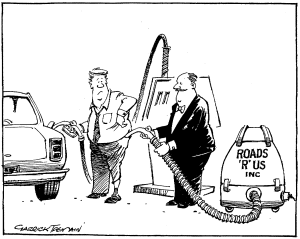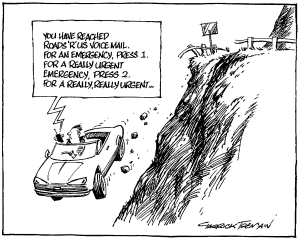This page is not a current Christchurch City Council document. Please read our disclaimer.
 The main principles necessary for a roading and transport system which will be fair and equitable to all road users and to the communities served by the road network include: The main principles necessary for a roading and transport system which will be fair and equitable to all road users and to the communities served by the road network include:
|
 Public Opinion Opposed to Government Plans
Public Opinion Opposed to Government PlansRecent nationwide research shows that only one in 20 New Zealanders is aware of and supports the Government’s roading reform proposals. Only 35 per cent of the 800 surveyed were aware of the plans. Of this group, just 15 per cent viewed the reforms favourably. The survey showed that, of those aware of the planned changes, key concerns are that the Government’s proposals will lead to higher costs for road users and transportation, and a drop in roading standards — particularly in rural areas. The same group considered that rural communities, the general public, road users and low income earners would be most disadvantaged by the planned changes. Over 60 per cent of respondents throughout New Zealand feel that their community has not had enough input into the Government’s plans. An overwhelming majority 91 per cent say that managers of the roading network should represent and be fully accountable to local communities, while 70 per cent believe local authorities to be the most appropriate managers of the roading network.
|
Why Commercialising Our Roads Will Not Work At the core of the Government’s plans to reform our roads is a proposal to transfer New Zealand’s $23 billion 90,000 km road network to commercial control. The plan published last December clearly demonstrates that the Government favours the control and management of our streets by a few commercially driven, profit- motivated companies. Whether or not these companies are ultimately in public or private ownership, the commercial pressures governing them will have the same result for communities and motorists. Unlike the Telecom or electricity networks, city streets and rural roads are far more than simply utilities. Roads define a city or region. Activity on them has a huge impact on the physical quality, economic viability and social systems of communities. To hand such a complex and vital part of what makes us a nation to a commercial board of directors is a very large step, and one which should not be taken without widespread public debate. Under a system of commercial management, the most important factors when decisions are made about roads would be profit and revenue considerations, not necessarily the needs of the communities served by the roads. Profit measures would be paramount. Road users would pay more to cover profits and company tax. Commercially- focused directors would make decisions about local roads. These directors would be remote from the communities served by the roads they have been appointed to manage, however the communities would experience a profound impact from their decisions. Decisions about roads greatly affect living and working environments in the communities served by the roads concerned. This is what commercialisation means. Some MPs agree with commercialisation of roads, while others believe that roads must be kept in local control. What does your MP think? Cut out and complete the accompanying form. Post it to your MP to find out whether he or she supports the Government proposal to commercialise our roads. The address is: (Name of MP), Parliament Buildings, Wellington. Remember — no stamp is required for postage to MPs.
|